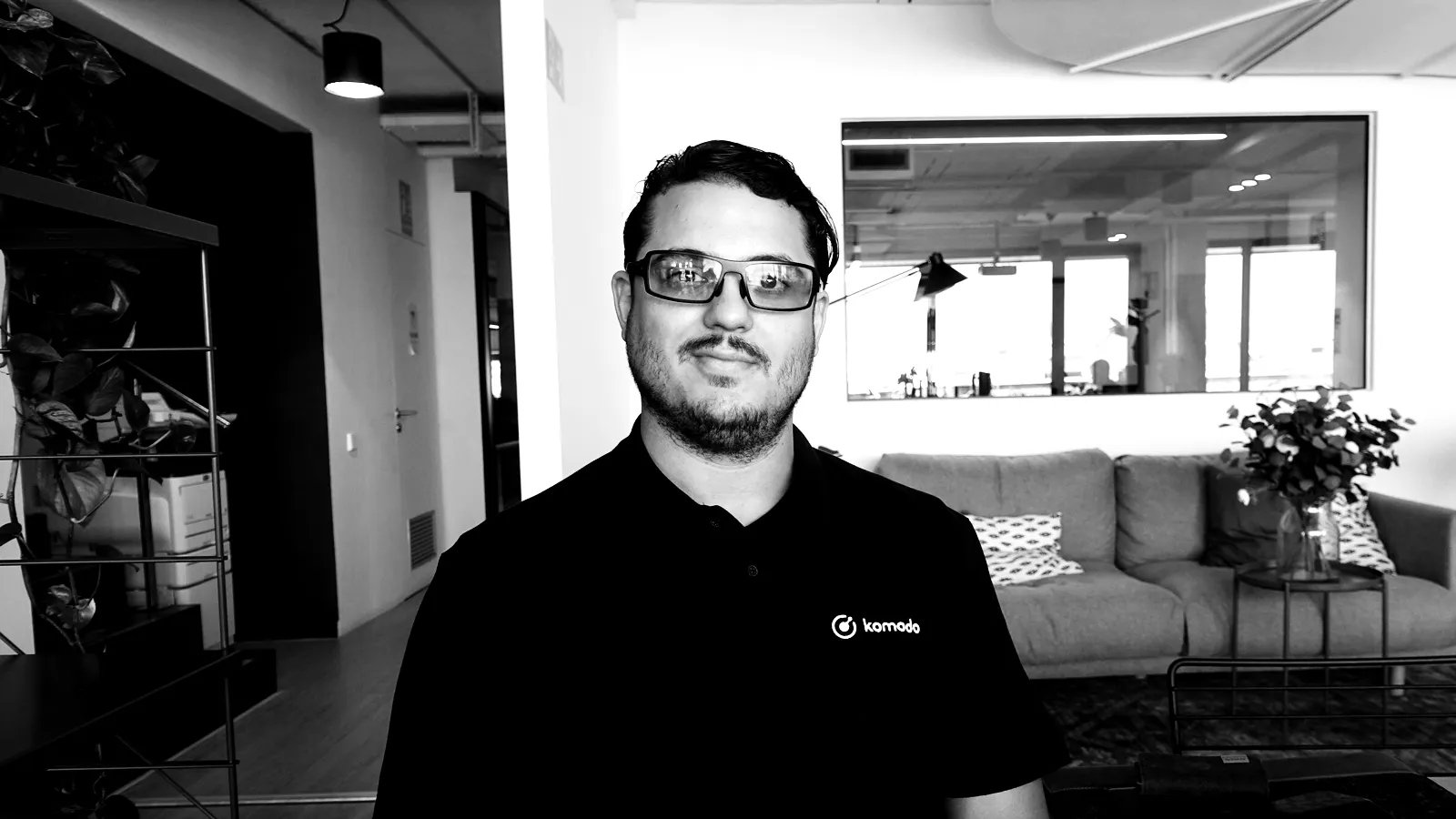Kadan Stadelmann is a blockchain developer, operations security expert, and Komodo platform’s chief technology officer (CTO). He started life writing code before he started school, before going on to work in operations security in the government sector in Austria and eventually working in the cryptography business. In this interview he explores his journey into blockchain, and why markets aren't a good measure of projects with the most promise.
How did you first get into blockchain and the decentralized web?
I first came across decentralized technologies when I was in high school, a time when I was actively coding a lot. Bitcoin wasn’t around back then but we used file-sharing clients, which utilized similar technologies. From 2011 to 2012, I spent some time traveling on the African continent and went through a period of personal deliberation.
I came to realize that my true passion was actively engaging with technologies that could make our world a more liberal, fair, and peaceful place. One of these technologies was Bitcoin and its underlying blockchain technology, as it has the power to offer a secure, borderless and non-inflationary form of currency, to provide global financial services to those without access to traditional banking services, and to create the foundation of a decentralized global economy that’s more equitable to all people.
I started GPU mining the same year just as a non-lucrative hobby and, later, in 2013 and 2014, I started actively contributing to various crypto-related projects while keeping my main focus on security and vulnerability detection and analysis.
When did you set up your company?
The Komodo project was publicly announced by the team in September 2016. The ICO was held in October and November of the same year. We raised 2,639 BTC, or a little less than $2 Million USD at the market price of BTC at the time, which is still a pretty modest raise compared to most blockchain projects that hold ICOs. The KMD coins bought in the ICO were distributed in January 2017 and the mainnet went live that same month.
Did you know?
I don’t have a main residence so I am largely nomadic. I travel around the world and work from wherever I am. Usually, I spend between one to three months in the same spot. Sometimes, I fall in love with a place and stay for six to 12 months or keep going back to certain places on a regular basis— like Spain and Africa, for example.
What need does it serve?
When we first started Komodo, it was an enhanced fork of the privacy project Zcash. In fact, in the early days, Komodo’s first value proposition was “Protecting Your Privacy With Bitcoin’s Hashrate,” but since then we have evolved and challenged the larger issues of blockchain sovereignty and scalability. The Komodo vision is to provide an easy set of tools that developers, startups, and enterprise businesses can all use to launch customized, application-specific blockchains, each of which is protected with the hash rate of the Bitcoin network.
Currently, some of the barriers stopping businesses from integrating blockchain technology are the cost of hiring blockchain developers, lack of advanced coding experience, or challenges with forking existing blockchains such as Ethereum or EOS. Blockchain developers are few and far between so we aim to provide business-friendly solutions where anyone can create their own custom and autonomous blockchain, regardless of blockchain development experience. Komodo’s real purpose is to provide an adaptable framework for blockchain development, from customizing and launching the chain itself to programming applications and software that run directly on one’s own independent chain.
Blockchain’s killer app is going to be a decentralized client that runs on all operating systems and devices.
Have you launched other companies before? What were they?
Prior to Komodo, I launched an IT company in the operations security space with former university colleagues. The company was successful and we were able to sell the company for a profit but, unfortunately, I’m not able to discuss this in detail, as I’m still under a non-disclosure agreement. I moved away from traditional IT entrepreneurship when I began getting involved with blockchain technology.
Can you give us a summary of your career thus far, how did you get here?
My passion for information and electronic technologies appeared at a very young age. I was raised in Northern Africa as the son of an Austrian diplomat and an African school teacher, so I received a multilingual education. I actually coded my first simple applications, like a calculator and a text-manipulation app, before entering primary school. Later, I studied IT and economics at universities in Germany and Vienna.
After my formal education was complete, I gained deep practical experience in IT security and network development while working in operations security in the government sector in Austria. Then, my career in the crypto industry began with penetration testing and bug-hunting various blockchain projects, codebases, apps and web platforms. This was also how I first got in touch with James ‘jl777’ Lee, who is now the lead developer of Komodo.
What have been the biggest challenges you’ve faced in building a business in this space?
At first, no one takes you seriously—banks, lawyers, accounting firms and even friends or relatives. Everyone just said, “What is this? Why aren’t you doing something ‘real’?” Of course, everyone has now seen how important blockchain technology has become around the world, so their attitudes have changed since I first got involved in the industry.
Forming a cohesive team was also a pretty tough task. The initial Komodo team was basically a dozen crypto enthusiasts and the first community members, many of whom were anonymous. Over time, we became a bit more formalized, such as requiring employees to sign contracts and non-disclosure agreements, while still remaining globally distributed and fully decentralized. The team has really evolved into a group of talented, hardworking, and extremely professional crypto experts.
What’s the best piece of advice you were given when it comes to being an entrepreneur in this space?
There are a lot of times when you know the odds are against you and there is a high chance that what you are doing or creating will not succeed or take off immediately. In those times, it’s important to accept the challenge and take the risk. Deliver more than what is expected and prove your potential to yourself! There is nothing more satisfying that delivering on your promises and showing everyone what you are capable of.
What advice would you give to someone setting up a business in the decentralized web?
You need to believe in yourself and your project. You’ll also need to invest a great deal of time in forming the initial team. Only with a solid team will you be able to achieve big things.
Do not look at crypto markets and financial capitalization of the various blockchain projects. The markets aren’t always a true reflection of which projects show the most promise. Only by distinguishing between the technology and the market will you be able to experience the true potential of blockchain technology. Money is the wrong motivation in this industry.
If you built your business all over again, what would you do differently?
In the beginning, Komodo didn’t have the ecosystem layers we see today, which include third-party service providers, as well as many independent developers with different backgrounds and areas of expertise. So if I were to go back and do things over again, I would likely try to bring third-party projects and devs into the Komodo ecosystem earlier on.
What project or projects are you most excited about (that aren’t yours!)
I am really excited about new technologies that aim to bring decentralized governance to the industry, like what Tezos is doing, for example. Recently, I have also been following VerusCoin closely, a project that solved the two biggest proof-of-stake issues, the “nothing at stake” problem and the “weak subjectivity” problem.
What is (or what will be) blockchain’s ‘killer app’?
Blockchain’s killer app is going to be a decentralized client that runs on all operating systems and devices (PC, smartphones, IoT, etc.) and interconnects all blockchain networks and even other p2p networks/technologies to build a base foundation layer for a trustless and meritocratic society. It would be an app that enables anyone from anywhere at any time to participate in this “virtual” world to communicate, earn money and/or respect and to build a reputation. Essentially, a “software-collage” of social networks, blockchain, fintech/banking, freedom of speech, economic systems, and meritocracy. This is something that Komodo looks to build in the long-term— so not something on our immediate roadmap, but a goal that we have in the back of our minds as we continue to develop and innovate new technologies.
What’s the difference between setting up a company in the decentralized space versus regular business?
The biggest difference is in the people you will work with but also the structure and organizational aspects. Most blockchain companies aren’t just technically decentralized but also work in a decentralized manner— meaning working remotely, in different timezones, and sometimes without ever meeting each other in real life. Instead of a traditional office building, encrypted channels and chat-rooms are our workspaces.
How would you describe blockchain to someone who has never heard of it before?
It’s a decentralized and distributed network that allows different people to exchange data and value without having to trust one another. These peer-to-peer exchanges are completely secure, based on advanced cryptographic and mathematical techniques, and once a transaction is complete, no one can delete, shut down, spoof or edit.

